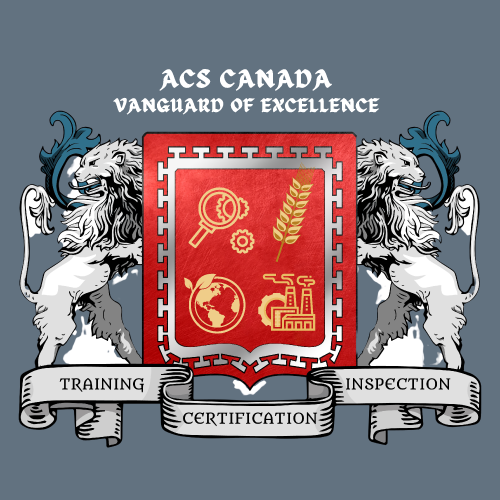GREEN INDUSTRY CERTIFICATION

SUSTAINABILITY AWARD
The Earth is currently confronted with a myriad of pressing environmental issues, ranging from global warming and air pollution to ozone layer depletion, water pollution, and climate change. These challenges affect every human and animal on the planet, necessitating adjustments in our everyday actions to embrace eco-conscious designs and remain mindful of environmental issues and their implications.
Promoting knowledge and awareness of sustainable practices in businesses and services plays a vital role in fostering the growth and dissemination of environmental culture. Recognizing this, ACS Canada, as one of the premier accredited certification bodies for audit and certification of environmental management systems worldwide, has defined a set of environmental principles specifically tailored for the manufacturing and service industries. The Green Industry Program, based on this framework, assists entities in managing change and improving performance related to environmental aspects and impacts. It has been created to facilitate the transition towards a more sustainable, environmentally conscious approach while also driving cost reduction.
The Green Industry Program offered by ACS Canada comprises eight fundamental principles that serve as guiding pillars for environmentally responsible practices in the manufacturing and service industries:
1. Water Efficiency: This principle emphasizes the importance of implementing measures to optimize water usage and promote efficient water management throughout operations.
2. Waste Management: Effective waste management practices are crucial for minimizing environmental harm. This principle focuses on strategies to reduce waste generation, promote recycling and reuse, and ensure responsible waste disposal.
3. Reversibility to Nature: Encouraging practices that are easily reversible to nature is a key aspect of environmental sustainability. This principle emphasizes the implementation of processes and technologies that support the restoration and preservation of natural ecosystems.
4. Stability: stability refers to the adoption of practices that ensure the safety, quality, and stability of products. This principle emphasizes measures to minimize waste, enhance preservation techniques, and promote sustainable practices.
5. Consumption of Natural Resources: This principle underscores the importance of responsible consumption of natural resources, such as energy and raw materials. It encourages entities to adopt efficient resource utilization practices, minimize waste, and explore renewable alternatives.
6. Reduce Environmental Pollutants: This principle focuses on minimizing environmental pollutants resulting from manufacturing and service activities. It emphasizes the adoption of clean technologies, pollution prevention measures, and continuous improvement in reducing the ecological footprint.
7. Training Record of Green Principles: Building a culture of environmental awareness and responsibility within the manufacturing and service industries requires continuous training and education. Organizations are encouraged to maintain comprehensive records of training programs that promote green principles among their employees.
8. Transparency: Transparency is a fundamental aspect of green industry practices. This principle emphasizes the need for entities to disclose their green policies, objectives, performance, and progress, allowing for external verification and evaluation.
The implementation and certification of the Green Industry Program bring numerous benefits to organizations. By limiting their impact on the environment, entities can alter their lifestyle and strive for a healthier, more sustainable life. The primary rationale for embracing sustainable practices is to safeguard the environment, ensuring its stability and existence for future generations. Additionally, sustainable living offers opportunities for cost reduction, providing organizations with simple ways to cut expenses while aligning with environmentally responsible practices.
ACS Canada's Green Industry Program, with its comprehensive principles, empowers entities in the manufacturing and service industries to embrace sustainable practices, minimize environmental impact, and drive positive change. By implementing and certifying their commitment to these principles, organizations can enhance their reputation, attract environmentally conscious customers, and contribute to the preservation of the environment for a more sustainable future.WHY ACS CANADA?
The implementation and certification of ACS Canada's Green Industry Program offer a multitude of benefits for organizations in the manufacturing and service industries. By adopting environmentally responsible practices and obtaining certification, entities can unlock numerous advantages:
1. Enhanced Reputation: Green industry certification from ACS Canada establishes an organization as a leader in sustainable practices. It demonstrates a commitment to environmental responsibility, earning recognition and respect from customers, stakeholders, and the community at large.
2. Competitive Advantage: Green certifications differentiate organizations from their competitors, showcasing their dedication to sustainable business practices. It can be a key factor in attracting environmentally conscious customers who prioritize working with socially and environmentally responsible partners.
3. Cost Savings: Implementing sustainable practices often leads to significant cost savings in the long run. By optimizing resource consumption, reducing waste, and improving energy efficiency, organizations can reduce operational expenses and enhance their bottom line.
4. Regulatory Compliance: Green industry certification ensures that organizations are compliant with environmental regulations and standards. It provides assurance to regulatory bodies that the organization is committed to environmentally responsible practices, reducing the risk of non-compliance penalties and legal issues.
5. Improved Operational Efficiency: Adopting sustainable practices often leads to streamlined operations and improved efficiency. By optimizing processes, reducing waste, and minimizing environmental impact, organizations can achieve greater productivity, cost-effectiveness, and overall operational excellence.
6. Employee Engagement and Satisfaction: Green certifications contribute to a positive work environment, promoting employee engagement and satisfaction. Employees are more likely to feel proud of their organization's commitment to environmental sustainability, leading to increased motivation and loyalty.
7. Access to New Markets: Green industry certification opens doors to new markets and business opportunities. Many clients, suppliers, and partners prioritize working with organizations that demonstrate environmental responsibility, providing expanded avenues for growth and collaboration.
8. Long-Term Sustainability: By adopting and certifying green practices, organizations contribute to the long-term sustainability of the planet. They become part of the global effort to mitigate climate change, reduce environmental degradation, and preserve natural resources for future generations.
ACS Canada's Green Industry Program, with its comprehensive principles and certification process, empowers organizations to achieve these benefits and become leaders in sustainability. By obtaining certification, organizations not only demonstrate their commitment to environmental responsibility but also position themselves for success in a rapidly changing business landscape that increasingly values sustainability and green practices.
Training at ACS Canada
ACS employs accelerated learning methods to ensure a comprehensive grasp of all certificates. Our approach involves contextualizing your learning through a wide array of options, including classroom instruction, workshops, as well as interactive and online sessions.
GREEN INDUSTRY CERTIFICATION Training - 1

ISO 14067 Carbon Footprint
Quantification of the carbon footprint of a product
More About This CourseGREEN INDUSTRY CERTIFICATION Training - 2

ISO 14007 Training Course
The aim of this course is to provide delegates with the knowledge and skills required to understand guidelines and steps of environmental costs and benefits-ISO 14007 and sustainability. ISO 14007 environmental costs and benefits concept: ISO 14007: “Environmental costs are any costs related to the environment, which can result from, for example, the loss of […]
More About This CourseGREEN INDUSTRY CERTIFICATION Training - 3

ISO 14006 Eco-Design
The aim of this course is to provide delegates with the knowledge and skills required to understand guidelines of Eco-Design-ISO 14006 and sustainability. ISO 14006 concept of Eco Design: ISO 14006: “Organizations are recognizing both the need to reduce adverse impacts on the environment from their product(s) and the need to include environmental considerations in […]
More About This CourseGREEN INDUSTRY CERTIFICATION Training - 4

ISO 50001 Requirements
The aim of this course is to provide delegates with the knowledge and skills required to understand requirements and documentation against the requirements of EnMS-ISO 50001
More About This CourseGREEN INDUSTRY CERTIFICATION Training - 5

Energy Saving Training Course
Through our training programs, we offer companies tools, resources, and training to help improve their organization’s energy understanding and performance. With our energy specialist mentor who are experienced as a registered energy advisor, we train companies and individuals to improve their sights of energy management and cut utility costs. Energy Mentor training empowers participants to […]
More About This CourseGREEN INDUSTRY CERTIFICATION Training - 6
ENVIRONMENTAL MANAGEMENT

ISO 14001 – Lead Auditor
This course aims to teach the principles and practices of ISO 14001 third-party audits. This course could be certified by Exemplar Global.
More About This CourseGREEN INDUSTRY CERTIFICATION Training - 7
INTERNAL AUDITOR COURSE

ISO 14001 – Internal Auditor
This course aims to teach the principles and practices of effective Environmental Management System first and second-party audits.
More About This CourseGREEN INDUSTRY CERTIFICATION Training - 8
REQUIREMENTS AND DOCUMENTATION

ISO 14001 Requirements
The aim of this course is to provide delegates with the knowledge and skills required to understand ISO 14001 requirements and documentation.
More About This Course
